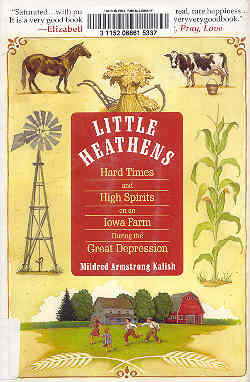Little Heathens
Mildred Armstrong Kalish

“My childhood came to a virtual halt when I was around five years old. That was when my grandfather banished my father from our lives forever for some transgression that was not to be disclosed to us children, though we overheard whispered references to bankruptcy, bootlegging, and jail time. His name was never again spoken in our presence; he just abruptly disappeared from our lives. The shame and disgrace that enveloped our family as a result of these events, along with the ensuing divorce, just about destroyed my mother. Is is possible today to make anyone understand the harsh judgment of such failures in the late 1920's? Throughout my entire life, whenever I was asked about my father, I always said that he was dead. When he actually died I never knew.”
Thus begins the first chapter of Little Heathens, Mildred Kalish's memoir of growing up on her grandparents' Iowa farm during the Great Depression. Rather than being overwhelmed by their circumstances, she and her siblings and their mother counted themselves among the lucky ones of that era, having the support of family and the farm on which to live. Subtitled High Times and High Spirits on an Iowa Farm During the Great Depression, her story tells of a way of life that few these days would recognize, and fewer remember.
“On the farm, children were drafted into the workforce early. Even the youngest could pull radishes, pick and shell peas and beans, harvest strawberries, and help wash vegetables. Tiny tots were taken along to the garden whenever an adult went, and they simply followed the example set before them. They seemed to have a natural inclination to be useful, and, of course, the praise they received encouraged them no end.
My sister and I found washing the take from the farm garden to be a special delight. Immediately after harvesting the vegetables we would go to the windmill, which was not far from the house, pump fresh water onto them, and clean them with a brush that we kept hanging on the pump along with a tin cup for drinking. One the sweet grass by the mill we would husk and desilk the sweet corn, look over the oak leaf lettuce for tiny jade green inchworms, remove the tops from the carrots and radishes, and scrub the new potatoes; then we would rewash everything and tote the dishpan of veggies, spanking clean, to the kitchen. We didn't have to clean up our leavings, because the sheep and the two retired horses that had the run of the huge yard would soon make short work of the garden debris.”
Little Heathens is filled with memories, recipes, and tips on everything from skinning a rabbit to treating ailments of one sort or another with homemade remedies; it portrays a world of hardship and hard work tempered with simple rewards. Kalish's story of her childhood shows how the right stuff can make even the bleakest of times “quite a romp.” Be sure to read all about it.
All Rights Reserved.